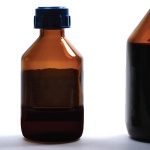Iodine is a naturally occurring element necessary for human growth and metabolic function. Its chemical symbol is I and its atomic number is 53 on the Periodic Table of Elements. It is one of the rarer earth elements necessary for life. Most of the earth's iodine can be found in the oceans. Iodine and IodideLength: 2 minutes What Is Elemental Iodine? In nature, iodine exists as elemental iodine or as an iodide. Elemental iodine is two iodine atoms bonded together. In this form, iodine should never be ingested or applied […]







